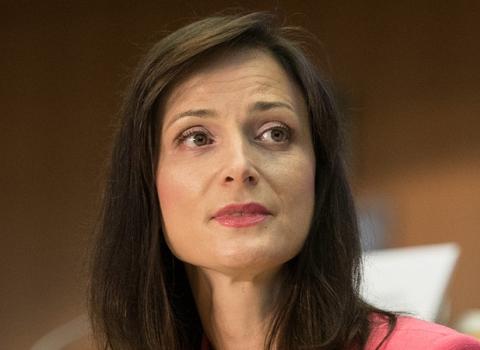Hard-pressed governments lack time and capacity to agree on long-term funding for 2021 - 2027

EU commission president Ursula von der Leyen during a video conference with EU leaders on response to the coronavirus outbreak. Photo: European Commission
As governments across Europe desperately firefight COVID-19, minds in Brussels are turning to contingency plans for the multi annual financial framework (MFF), the next seven-year EU budget that is due to run from the start of next year.
Ursula von der Leyen, European Commission president, on Saturday said she would unveil a new proposal for the 2021-2027 budget, designed to help keep the finances afloat after the coronavirus crisis. These plans will include a recovery package for the inevitable COVID-19-induced economic shock, von der Leyen said.
But budget negotiations are notoriously difficult in ordinary times and now, with governments facing all-consuming health and economic emergencies at home, the chances for member state approval of the MFF, worth €1.095 trillion, are slim.
“The pandemic is now the one and only headline. And next year, we might be facing a major recession and structural unemployment in most parts of the EU. Doing serious long-term financial planning under these circumstances is very difficult,” said Peter Fisch, a former civil servant in the commission who managed EU research programmes for 20 years.
The most recent attempt to build consensus amongst European capitals on the budget was a near-30 hour summit in February, which ended with little progress. There is no date for resuming talks, with government attention and capacity drying up across the continent, leading officials to open discussions on emergency measures.
“It is time to recognise that the COVID-19 crisis makes it impossible to conclude the MFF negotiations in the foreseeable future and that a ‘second-best’ contingency plan is needed,” says Marta Pilati, policy analyst at the European Policy Centre (EPC), a Brussels-based think tank.
Even if leaders could find the time, it is no longer possible for them to physically meet, Pilati said. “Online meetings would hardly be successful, given that the final stages leading to MFF deals tend to depend greatly on informal, face-to-face discussions between EU leaders.”
“If we knew that there was a solution for the present situation – a prospective vaccine – we would have much better conditions to negotiate the MFF,” said Maria da Graça Carvalho MEP. “At present, the conditions are very difficult. We have too many uncertainties about the end of the crisis.”
But with some economists forecasting a deep recession in Europe, failure to agree on the MFF by the end of the year would be a “fatal signal”, warns Christian Ehler MEP. “The leaders know it would be very problematic and terrible for R&D investments,” he said.
Plan B
Brussels officials, for now, are undeterred – and are still planning on a seven-year MFF. The German government, which takes leadership of the EU Council for six months starting in July, is counting on this too.
Within the commission however, civil servants are also quietly scoping out Plan B.
Under the terms of the current MFF, the commission has the discretion to extend the budget for at least one year. In practice, this means apart from the UK which left the EU in January, the 27 member states would pay into the EU budget on the same GDP formula as in 2020.
The allocation of the budget would continue as in the old MFF, so research will get the same share as it does in 2020.
The option of a one-year extension would not require any special legislation beyond the normal annual budget process. So parliament, council and the commission would hold off on the long-term MFF deal, but authorise a 2021 budget together.
If needs be, this process could be accelerated to happen in weeks, at the very end of 2020.
Jan Palmowski, secretary-general of the Guild of European Research-Intensive Universities, believes this is the most likely outcome. “Agreement up to now has been difficult,” he said. “And with the differences on dealing with the coronavirus pandemic, agreement could be even harder to reach.”
The dust needs to settle before we can be sure what kind of long-term investment is needed to help Europe recover, says Alison Hunter, senior adviser on regional policy, innovation and industrial growth at the European Policy Centre. “A new one-year budget could offer the breathing space to determine how the whole MFF will need to be re-designed,” she said.
Plan C
One Plan C would be for the commission to operate month-to-month from January 2021. Under the budget regulations, it can simply take an extension of the 2020 budget one month at a time, as it has done in past budget deadlocks.
The operating assumption inside the commission is that the council and upcoming German presidency will keep pushing for a full seven-year deal, but could decide as late as December to give up and go for a one-year or month-to-month extension.
That would mean that new initiatives, such as the research missions and partnerships in Horizon Europe, the 2021-2027 research programme, won’t start.
But funding for existing projects would continue, and the commission would have latitude to morph them more towards new policy priorities, such as the COVID-19 response and the Green Deal, the EU’s huge decarbonisation programme.
COVID exit strategy
Any response by Brussels to the crisis has to be deployed rapidly, said Carlos Zorrinho MEP. “This is not the time to count money, it’s a time to find real working solutions. People are not prepared to put up with bureaucracy in crises – already, people are asking me if Europe is able to give quick answers,” he said.
A pared-back EU budget is the last thing Europe needs, Zorrinho argues. “You can make changes to the budget packages – but to reduce the overall spend is the wrong signal to give now.”
EU officials argue that investment in research, climate change and digitisation remain just as necessary as they were two months ago.
The commission, for now, has not given any details of how much bigger its new budget proposal will be than the old one, or when it will release it. The EU executive is calling it a “work in progress.”
Reconstruction task ahead
The crisis is expected to fundamentally change negotiations on MFF – whether they happen this year or next.
Before coronavirus, southern and eastern countries wanted to soften planned cuts to the cohesion programmes for regional development, and a group of EU states led by France was pushing for more money for agriculture. EU officials concede the crisis will have only strengthened both these claims.
Von der Leyen’s administration has big ambitions on issues ranging from climate change to digital transformation, but recovery will be the primary concern for governments over the coming years, as they try to restart economies crippled by the coronavirus pandemic.
“My worry is that all the nice words about the need to invest in research and technologies to fight the current crisis might actually stop once a remedy against coronavirus is available and the massive damage to the real economy becomes the number one worry of European policymakers,” said Fisch.
The crisis is blowing a massive hole in Europe’s pocketbook, with governments announcing multibillion-euro rescue packages to support companies, workers and healthcare systems. Brussels isn’t exempt from the enormous bill, having already launched a €37 billion emergency funding plan.
Money was a big obstacle in MFF talks even before coronavirus. A group of four self-declared net contributor ‘frugal’ countries, led by the Netherlands, has previously refused to raise the budget above 1 per cent of the EU's combined gross national income.
“The crisis further highlights the need to invest in research and innovation, to develop vaccines and treatment methods for COVID-19, but also for other future health threats,” Henna Virkkunen MEP said. “The parliament should continue to insist on reserving €120 billion for Horizon Europe.”
Kurt Deketelaere, secretary general of League of European Research Universities, believes the crisis is an opportunity to convince the frugal member states to make higher contributions to the EU budget and pave the way for an agreement this year. The Commission could consider creating a research mission or a public-private partnership that deals specifically with advancing our knowledge on viruses, but the crisis has underlined the need for bottom-up multidisciplinary research, Deketelaere said.
Thomas Estermann, director for governance, funding and public policy development at the European University Association, sees MFF postponement as “a realistic possibility,” saying, “The world has massively changed.” However, continued investment in fundamental research is one way to lay the foundations for recovery from the impending economic crisis.
Fighting on many fronts
Some are suggesting financial relief for the countries hit hardest by the pandemic. Italy and Spain, which to date have the highest number of COVID-19 deaths in Europe, contributed €12 billion and €8 billion respectively to the 2018 EU budget. These countries could have part of their contribution to the 2021 budget waived, as a one-off discount, or in exchange for larger contributions in the following years, Pilati suggests.
Given the exceptional circumstances, “It may be necessary to reduce national co-financing rates for a limited period,” agrees Carolina Vigo, an adviser for research, innovation and energy policy at BusinessEurope, the industry lobby group.
Budget talks are further complicated by the UK's departure, which will leave a hole in Brussels coffers amounting to an estimated €75 billion over the next seven years.
Voices are beginning to urge London and Brussels to hit pause on Brexit negotiations and seek to extend the transition period, to allow breathing space to fight the pandemic.
Key staff, including the UK prime minister's chief Brexit negotiator David Frost, are self-isolating with suspected COVID-19 symptoms. Michel Barnier, the EU’s chief Brexit negotiator, has already tested positive for the infection.
The UK government however maintains it will not extend the period of talks beyond the end of 2020. “COVID-19 has certainly put pressure on the UK and EU – but I suspect we won’t know until June time whether an extension goes ahead or not,” said Georgina Wright, senior researcher at the Institute for Government think tank in London.
Others say it’s one more problem neither the UK or the EU needs to face right now. “Brexit, which practically no one is working on right now, has the potential to be a huge problem if left unsolved by the end of the year,” said Ehler.





 A unique international forum for public research organisations and companies to connect their external engagement with strategic interests around their R&D system.
A unique international forum for public research organisations and companies to connect their external engagement with strategic interests around their R&D system.